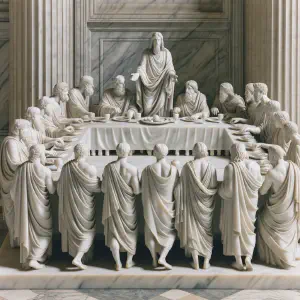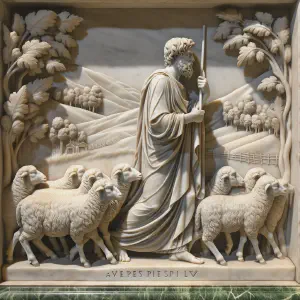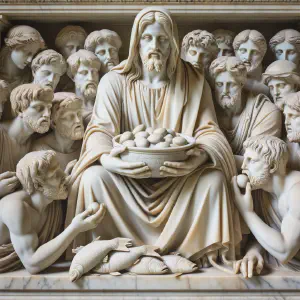Feast of Hope
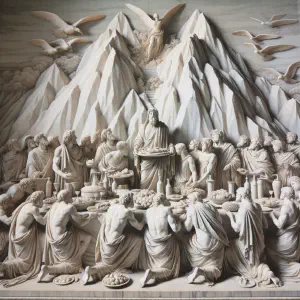
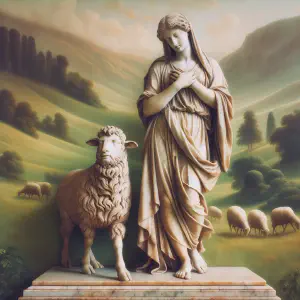
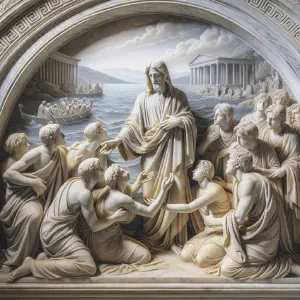
Jesus, moved by the plight of the people who had followed him for days, addressed their hunger. Despite the disciples’ doubts about feeding such a multitude in a desolate place, Jesus demonstrated the miraculous provision of God. With just seven loaves and a few fish, He gave thanks and distributed the food. Miraculously, everyone ate and was satisfied, and the leftovers filled seven baskets. This act of feeding not only nourished their bodies but also their faith, serving as a tangible sign of the Lord’s promise to provide for His people in abundance.
Five Questions
What is the significance of the feast described in Isaiah 25:6-10a?
The feast in Isaiah represents God’s ultimate provision and salvation. It’s a metaphorical depiction of a time when God will end all suffering and sorrow. This feast, with its rich food and choice wines, symbolizes not just physical nourishment but spiritual fulfillment and the joy of salvation. It’s about God removing the barriers that separate us from Him and one another, portrayed through the imagery of destroying the veil that covers all nations.
How does Psalm 23 complement the message in Isaiah?
Psalm 23 beautifully complements Isaiah’s message by portraying God as a caring shepherd. It focuses on God’s guidance, protection, and provision in our daily lives. The psalm reassures us that even in the darkest times, God is with us, leading and comforting us. This idea of God providing for His people, like a shepherd does for his flock, ties back to Isaiah’s theme of God’s abundant provision and care.
In Matthew 15:29-37, how does Jesus’ miracle of feeding the multitude relate to these Old Testament readings?
Jesus’ miracle of feeding the multitude is a practical demonstration of the themes in Isaiah and Psalms. It shows Jesus as the fulfillment of God’s promise to provide for His people. By miraculously feeding thousands with just a few loaves and fish, Jesus illustrates God’s ability to provide abundantly, even in situations that seem impossible. It’s a testament to God’s compassion and care, mirroring the spiritual nourishment and fulfillment prophesied in Isaiah.
What do these scriptures collectively teach about God’s nature?
Collectively, these scriptures highlight God’s nature as a provider, healer, and savior. They reveal a God who is deeply concerned with the physical and spiritual well-being of His people. God is portrayed as a generous host, a caring shepherd, and a miraculous provider. These passages encourage us to trust in God’s providential care and to seek Him for our spiritual and physical needs.
How can we apply the lessons from these scriptures in our daily lives?
We can apply these lessons by cultivating a deep trust in God’s provision and guidance. In practical terms, this means turning to God in prayer, especially in times of need or uncertainty. We should also emulate Jesus’ compassion and care for others, being mindful of the physical and spiritual needs of those around us. These scriptures invite us to live with an attitude of gratitude and hope, recognizing God’s presence and provision in our daily experiences.
Bible Study
Isaiah 25:6-10a
On this mountain the LORD of hosts
will provide for all peoples
A feast of rich food and choice wines,
juicy, rich food and pure, choice wines.
On this mountain he will destroy
the veil that veils all peoples,
The web that is woven over all nations;
he will destroy death forever.
The Lord GOD will wipe away
the tears from all faces;
The reproach of his people he will remove
from the whole earth; for the LORD has spoken.
On that day it will be said:
“Behold our God, to whom we looked to save us!
This is the LORD for whom we looked;
let us rejoice and be glad that he has saved us!”
For the hand of the LORD will rest on this mountain.
This passage from Isaiah depicts a prophetic vision of a grand feast prepared by the Lord, symbolizing the fulfillment of God’s promises to provide for and save His people. The characters are metaphorical, representing all nations and peoples. The removal of the veil and destruction of death signifies the ultimate triumph over sin and mortality, aligning with Catholic teachings on the resurrection and eternal life. The passage underlines Catholic values of hope, divine providence, and the universality of God’s salvation.
Psalm 23:1-3a, 3b-4, 5, 6
R. (6cd) I shall live in the house of the Lord all the days of my life.
The LORD is my shepherd; I shall not want.
In verdant pastures he gives me repose;
Beside restful waters he leads me;
he refreshes my soul.
R. I shall live in the house of the Lord all the days of my life.
He guides me in right paths
for his name’s sake.
Even though I walk in the dark valley
I fear no evil; for you are at my side
With your rod and your staff
that give me courage.
R. I shall live in the house of the Lord all the days of my life.
You spread the table before me
in the sight of my foes;
You anoint my head with oil;
my cup overflows.
R. I shall live in the house of the Lord all the days of my life.
Only goodness and kindness follow me
all the days of my life;
And I shall dwell in the house of the LORD
for years to come.
R. I shall live in the house of the Lord all the days of my life.
Psalm 23, attributed to King David, a central figure in Jewish history, presents God as a shepherd, guiding and protecting His flock. This psalm aligns with Catholic values by emphasizing trust in God’s guidance (echoing the commandment to have no other gods) and His comforting presence in times of trial, reflecting Catholic teachings on divine providence and the goodness of God. It also resonates with the acts of mercy, as it portrays God providing rest, refreshment, and safety, akin to caring for the needy.
Matthew 15:29-37
At that time:
Jesus walked by the Sea of Galilee,
went up on the mountain, and sat down there.
Great crowds came to him,
having with them the lame, the blind, the deformed, the mute,
and many others.
They placed them at his feet, and he cured them.
The crowds were amazed when they saw the mute speaking,
the deformed made whole,
the lame walking,
and the blind able to see,
and they glorified the God of Israel.
Jesus summoned his disciples and said,
“My heart is moved with pity for the crowd,
for they have been with me now for three days
and have nothing to eat.
I do not want to send them away hungry,
for fear they may collapse on the way.”
The disciples said to him,
“Where could we ever get enough bread in this deserted place
to satisfy such a crowd?”
Jesus said to them, “How many loaves do you have?”
“Seven,” they replied, “and a few fish.”
He ordered the crowd to sit down on the ground.
Then he took the seven loaves and the fish,
gave thanks, broke the loaves,
and gave them to the disciples, who in turn gave them to the crowds.
They all ate and were satisfied.
They picked up the fragments left over–seven baskets full.
In this Gospel passage, Jesus, the central figure of Christianity, performs the miracle of feeding the multitude, highlighting his role as a provider and healer. This miracle demonstrates the fulfillment of Old Testament prophecies and embodies Catholic values of compassion, care for the needy, and trust in divine providence. The act of Jesus feeding a large crowd with scarce resources reflects the Catholic teachings on the Eucharist and the abundance of God’s grace. It also aligns with the acts of mercy, specifically feeding the hungry and caring for the less fortunate.
Lessons
These sacred passages impart the lesson of unwavering faith in God’s providence and compassion. In Isaiah, we learn of God’s promise to end suffering and provide abundantly for all, symbolized through a lavish feast. Psalm 23 reassures us of God’s guidance and protection, even through life’s darkest moments. In the Gospel of Matthew, Jesus’ miracles of healing and the feeding of the multitude illustrate His divine authority and the fulfillment of God’s promises. These scriptures collectively teach us about trusting in God’s plan, His capability to provide in seeming scarcity, and the ultimate salvation He offers to those who believe.
Meditation Prayer
